Sider
onsdag 25. desember 2013
onsdag 18. desember 2013
Psychiatric hospital for performance

A BCD activist, Ales Charkashyn, was taken to Brest psychiatric hospital.
He was taken to hospital from the Leninski district police department after a permanence on the steps of the regional executive committee building.
This information was received from Zmitser Shukhrai, a coordinator of the organising committee to create the Belarusian Christian Democracy party (BCD) in the Brest region, Radio Svaboda reports.
“I called Brest's Leninski district police department. An officer on duty told me no trial was expected so far, because doctors from the psychiatric hospital showed interest in the activist.
Ales was taken for a psychiatric examination. It may take up to three days. If he is found sane, the police will charge him with holding an unsanctioned action. I think it is a provocation organised by the KGB. It's unlikely that police officers called doctors. It was done to put psychological pressure on Ales and discredit him. I can say that Ales Charkashyn is a normal and adequate person. The action was unusual, but a performance is supposed to be unusual,” Zmitser Shukhrai says.
Ales Charkashyn held a one-man performance on the steps of the Brest region executive committee. The man chained his hands and poured red paint on them. He then delivered a speech to residents and the city authorities.
Ales Charkashyn said Belarus would meet days turmoil, so everyone should turn to God and repent. He called on the authorities to “stop oppressing and robbing people, otherwise they will bear responsibility for the shed blood.”
Kilde : http://charter97.org/en/news/2013/12/16/81930/
onsdag 11. desember 2013
The Square and Maidan against losers
12:41, Natallia Radzina — Opinion
Photos from the Maidan in Kyiv were a déjà-vu.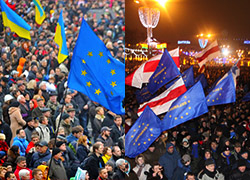 I saw that in Minsk, also in December, but three years earlier, in
2010. The year the dictatorship celebrated its 16th anniversary, dozens
of thousands of Belarusians went to the streets to demand changes,
despite years of repressions and elimination of all rights and
democratic freedoms.
I saw that in Minsk, also in December, but three years earlier, in
2010. The year the dictatorship celebrated its 16th anniversary, dozens
of thousands of Belarusians went to the streets to demand changes,
despite years of repressions and elimination of all rights and
democratic freedoms.Indeed, we were less than a million, only 50 thousand, but each and every one of us who came to the Square on December 19, 2010, was a hero, because we went there ready for the worst, fully aware of consequences. For all of us this day will be a landmark, personal Red Square-1968, a crucial event in our biographies, a line separating “before” and “after”.
We all came to the Square hoping not to be there alone. Do you remember the famous play by Yevgeny Vishnevsky “What Could I Do Alone?” The act was staged at the students’ theater of Moscow State University in the 1960s during the “thaw”. At first, one person comes out to the stage and asks the audience “What can I do alone?”, then another one comes out and asks the same question, then another one… The number of people on the stage is growing, and suddenly they notice that even though they are many they are still asking the same question.
Then, in December 2010, we saw we were not alone. We became friends, we became one family. There was the spirit of unity, we thought we could smell (and even taste) changes, there was no fear, only hope. And I am convinced that people of Kyiv are feeling the same today at the Euromaidan. Maybe each of them will have their own life afterwards, but today they have one life for them all.
But suddenly darkness fell over the city. Peaceful citizens craving freedom were executed by butchers with faces covered under helmets and masks. The same terrorists in balaclava tortured people in jails the way their predecessors from NKVD did in 1937.
In the KGB prison, we were isolated from the outer world and told just one thing: that everyone forgot about us, that everyone thought of us as of criminals. After my provisional release and prohibition to live in Minsk, before the trial, I understood that it was a lie: first of all, we had support of people of Belarus and hundreds of thousands of people around the world.
There were lots of statements, resolutions, extraordinary parliamentary sessions, even a threat of economic sanctions. Several people were released after this threat. Some of them were placed under a home arrest; some were banned from leaving the country – until the trial, unable to have a normal life. But most of the prisoners, including Lukashenka’s strongest peers who posed a real threat to his power, remained behind the bars.
Nevertheless, the West saw the transfer of some hostages from one prison to another as an attempt to meet its demands. The threat of actual economic sanctions disappeared. But most importantly, the decisiveness to support Belarusians’ aspiration to freedom disappeared, too. This decisiveness was stated in the article Lukashenka is a Loser by Foreign Ministers of Poland, Sweden, Germany and Czech, who claimed that the Belarusian dictator had lost the presidential elections.
But then, looking at the empty streets of the hollow occupied Minsk, Western authorities once again decide to work with the person whom they had publicly called a usurper. Political prisoners have many long years in jail ahead of them, their cries unheard behind the thick walls. Realpolitik has its own rules, people’s memory is short.
People forget the deed of thousands of Belarusians and trample their faith and hope. As for Lukashenka, he is still cleansing the country from any sign of political activity, gradually turning Belarus into a concentration camp, just like his idol Hitler. For that, he gets a prize – the World Championship in ice hockey. I think we all remember the Olympics 1936, planned by Western strategists as a tool to turn Hitler’s Germany towards a civilized path.
It’s not the point however. Today there is a risk that our neighbors, Ukrainians, will be betrayed. The entire world is watching their struggle. There is one million Ukrainians out there, but even so many people are no threat to the regime if the West doesn’t show any support.
“The main difference between Lukashenka and Yanukovich is that the first is a dictator while the latter was elected by his people,” Western politicians say and emphasize how “pointless” it is to demand that the Ukrainian president resigns. Who will sign the association agreement, they wonder?
And here we have it again: working with usurpers. People have been assaulted at the Maidan, offices of opposition parties and media have been attacked, censorship has been introduced on TV, free-thinkers have been arrested. After all that Yanukovich has lost his legitimacy.
An order to assault and arrest the people at the Maidan can come tonight, or maybe tomorrow. Just like in Belarus, the opposition leaders can be sentenced to 5-6 years in prison for “organization of mass disorders.” What can the West use as a counterweight? Statements, extraordinary parliamentary sessions, threats of sanctions that will never become real?
Maybe it’s time to stop dealing with loser-dictators and to start listening to the people who crave freedom and call for solidarity?
I know that the Square will happen again in Minsk, and millions will come this time. Just like they did in Kyiv and Moscow. We will keep coming until we have our victory.
Natallia Radzina, editor-in-chief of charter97.org
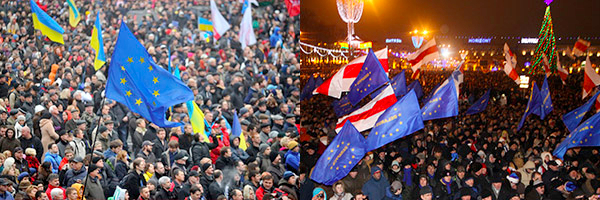
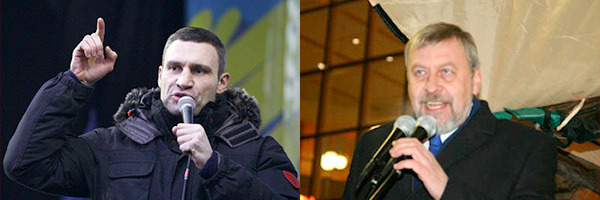
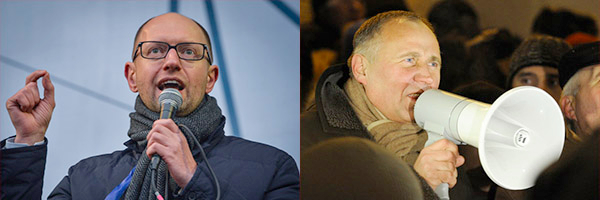
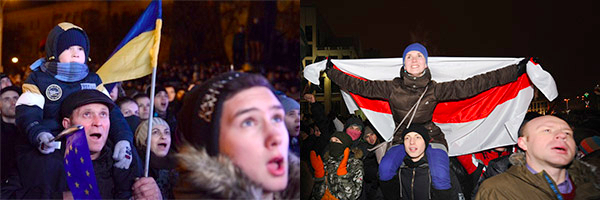

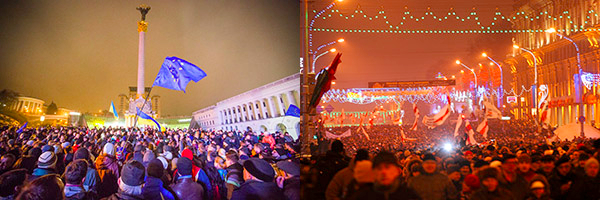
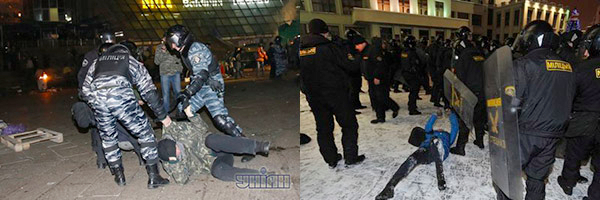
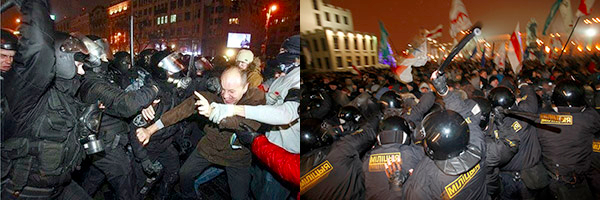
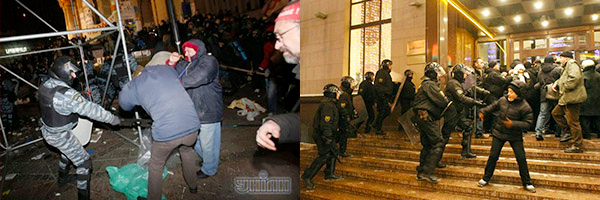
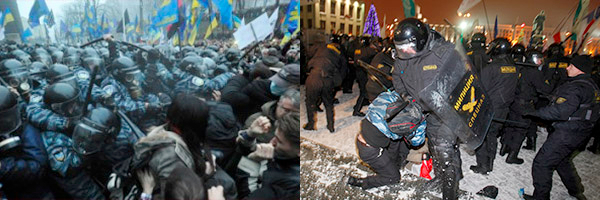
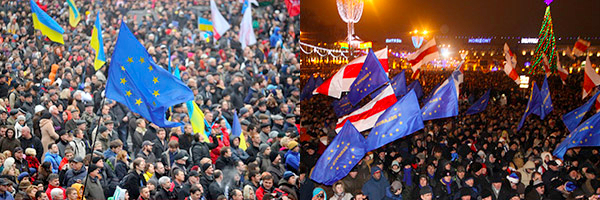
torsdag 28. november 2013
International tribunal is needed today on the situation in Belarus
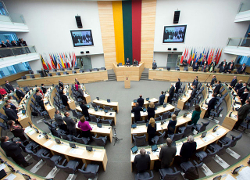 Special hearings on Belarus took place in Lithuanian parliament today.
Special hearings on Belarus took place in Lithuanian parliament today.They were timed to the Eastern Partnership summit, which would start in Vilnius, and had the aim of developing recommendations for the European Union and its policy towards Minsk.
The hearings were chaired by the deputy chairman of the Committee on International Relations of Lithuanian parliament Audronis Azhubalis and a parliament member Mantas Adomenas. In the hearings took part the head of the parliament’s Committee on International Relations Benediktas Juodka, leader of the parliamentary opposition and former Prime Minister of Lithuania Andrius Kubilus, relatives of Belarusian political prisoners Natalia Pinchuk, Maryna Lobava, Maryna Adamovich, the mother of the kidnapped journalist Dzmitry Zavadski Volha Zavadskaja, the chairwoman of the Belarusian Association of Journalists Zhana Licvina, the council member of the human rights center Tacciana Raviaka, charter97.org web-site’s editor in chief Natalia Radzina, the director of the Belarusian Human Rights House in Vilnius Hanna Hierasimava, representatives of the political opposition – co-chairmen of the organizational committee for creation of the party Belarusian Christian Democracy Paviel Sieviaryniec and Vital Rymasheuski, the leader of the Just World party Siarhiej Kaliakin, the leaders of Tell the Truth civic campaign Uladzimir Niakliajeu and Andrej Dzmitryjeu, deputy chairman of the Movement for Freedom Aliaksandr Lahviniec, a lawyer of the executive panel of the NGO Assembly Jury Chavusau and the coordinator of Eastern Partnership’s Civil Society forum from Belarus Andrej Jahorau.
The event was also attended by Lithuanian parliament members, the parliament’s ombudsman, representatives of foreign embassies and foundations.
As he was opening the hearings the Lithuanian parliament member Mantas Adomenas stated that human rights should not be forgotten with all the attention going to transit and exports. According to him, Lithuania should be the Europe’s mouthpiece for the Belarusians aiming towards freedom. “What is happening in Belarus reminds of the Soviet Union times”, - he said and emphasized that it is nowadays impossible to imagine that in Lithuania “journalists would be forbidden to tell what they want”. “This is the difference between Lithuania and Belarus. I can hardly imagine for political prisoners to be there in Lithuania”, - Mantas Adomenas claimed.
The leader of the parliament’s opposition Andrius Kubilus noted that the hearings were the indication that the situation in Belarus had not been forgotten. He claimed that sometimes one should actually force themselves to understand that “what is taking place in Belarus, and what people experience in their daily lives, are not just violations of human rights and democracy. There are human tragedies behind these words”. “It is impossible to put up with the current situation in Belarus, but our joint effort is required for that”, - he concluded.
Former political prisoners and relatives of the repressed spoke first at the hearings.
Paviel Sieviaryniec thanked Europe for the principled position on political prisoners. “If it was not for your adherence to the principles I would probably not have been here with you now, because it is only Europe’s firm stance that restrains the incumbent regime from more brutal repressions. Once such a principled position of Europe led to the world’s recognition of the fact of Soviet occupation of Lithuania, Latvia and Estonia”, - he claimed. Paviel Sieviaryniec emphasized that Belarusian political prisoners were hostages in the literal meaning of the word. “The regime keeps holding a critically important number of people, keeps bargaining. At the Belarus’ MFA they do not even hide the fact that there are political prisoners. The EU should proceed with sticking to its principles and insist on their release and exoneration”, - the politician said. He highlighted that another leverage over Lukashenka would be the Ice Hockey World Championship, which is scheduled to take place next year in Minsk.
Then spoke political prisoner Ales Bialiatski’s wife Natalia Pinchuk. She told about the situation, in which her husband is now. According to her, the conditions of his imprisonment have worsened. In the course of last year he did not have any long-term meeting and received only one parcel.
The mother of the disappeared journalist Dzmitry Zavadski Volha Zavadskaja reminded that nothing changed on the case of the kidnapped Belarusians in the past 12 years. “All the terms expire, and we are afraid that the topic of violent disappearances may vanish. It is very important for these crimes, which are crimes against humanity, were not forgotten”, - she claimed.
The wife of political prisoner, former presidential candidate Mikalaj Statkievich Maryna Adamovich shared in detail the latest news on his situation. The conditions have worsened. Maryna Adamovich emphasized that exoneration of political prisoners should remind on the agenda regardless of whether Belarus’ authorities do that or not.
The mother of political prisoner, Young Front’s co-chairman Eduard Lobau Maryna Lobava spoke at the hearings. She claimed that the conditions of her son’s imprisonment might be equated to tortures. “Only economic sanctions, introduced immediately after the events of 2010, helped release many political prisoners. Only owing to targeted economic sanctions, which took place, we now have 10 political prisoners instead of 50. Like before. The release of political prisoners and holding of free and fair elections should be demanded of the Lukashenka regime. After the fulfillment of these demands, one may speak of any dialogue or any cooperation”, - Maryna Lobava emphasized.
The chairwoman of the Belarusian Association of Journalists Zhana Licvina told about the situation with the freedom of speech in Belarus, having noted that the control became total over media. She listed the latest dangerous trends: practice of the use of the extremism law against a publishing house, emergence of such formulations as “activities against the interests of the Republic of Belarus”. She also expressed a concern of authorities’ intention to introduce the obligatory registration for most popular internet information sources.
A human rights activist Tacciana Raviaka told about the situation with Ales Bialiatski and listed the names of all the political prisoners in Belarus, having reminded that another criminal proceeding would start the next day on the case of a youth activist Vasil Parfiankou. This shows, according to her, how vulnerable political prisoners are after being released. “If activists engage in politics, they are immediately subjected to repressions”, -she said. The human rights activists observed that Belarus ignored its obligations in the framework of international organizations: none of the UN’s Human Rights Committee decisions were followed.
Political scientist Jury Chavusau told about the violations of the freedom of association in Belarus. He noted that a number of organizations have not been able to get registered for 10 years. Many are pushed out of the country to go abroad, criminal responsibility keeps existing for acting on behalf of non-registered organizations.
Eastern Partnership Civil Society Forum’s coordinator for Belarus Andrej Jahorau pointed out the problem of EU’s assistance to democratic organizations. He claimed that sometimes programs are implemented with the support of the European Union, which are used by the authorities for persecuting civil society activists.
A co-chairman of the organizational committee for the creation of the party Belarusian Christian Democracy Vital Rymasheuski quoted independent Lithuania’s first chairman of the parliament Vitautas Landsbergis, who said that the export of corruption takes place from East to West, when Western countries start treating dictatorships with pragmatism. The Belarusian politician noted that such an attitude, realpolitik, is being used by Europe in its relations with the Belarusian regime. That is why, according to him, it is time to raise the issue of protecting the democratic values in the EU countries.
The head of the United Civic Party Anatol Liabiedzka reminded that a business forum was taking place in Vilnius that day. “This is where we should have spoken. Probably, Lithuanian businessmen would have had their eyes opened. It would also be useful for them to listen to Vladislav Baumgertner – a businessmen close to the Kremlin, who spent several months in detention in Belarus”, - he said. The politician emphasized that MFA’s head Makej, who would take part in the Eastern Partnership summit, was not a minister at all, but a simple “mailman”, who executes the orders from the dictator.
Uladzimir Niakliaeu stated that Makej was not only a mailman, but an accomplice to the Lukashenka regime’s crimes. According to him, Belarus needed its own Magnitsky list, because the people, who violate human rights, feel their impunity. Uladzimir Niakliaeu noted that visa restrictions alone were not enough for the officials, who carried out repressions.
Movement for Freedom’s deputy chairman Aliaksandr Lahviniec pointed out that Belarus first and foremost needed a European perspective. According to him, this is the only guarantee of a good standard of living in our country.
The leader of the Just World party Siarhiej Kaliakin made a specific suggestion. According to him, there currently were not 10-12 political prisoners in Belarus.
“Those are all the country’s residents. Tens of thousands of people are in prisons, and each one of them is tortured. Gigantic number of people undergoes repressions. The creation of an international tribunal should be initiated on the situation in Belarus”, - he claimed.
Kilde/Source : http://charter97.org/en/news/2013/11/28/80711/
mandag 25. november 2013
27 november Heroes' Day
Heros Day i Hviterussland- en dag da det oppstod det væpnet opprøret i Slutsk i den nydannet Hviterussiske folkerepublikken i 1920 mot bolsjevikene.Hviterussere!De kjempet for sin frihet og fedrelandet! De ventet ikke på hjelp fra noen! De ville selv avgjøre egen skjebne! De ga sine liv for Belarus, for oss, for deg!Nittitre år siden. 27. november 1920, begynte Slutsk opprør. Våre forfedre kom for å kjempe for sitt land - Hviterussiske folkerepublikken.I kampen side ved side kjempet den Slutsky Grozovskii stick, Slutsk First Brigade Væpnede menn BNR. De fikk også med seg den hviterussiske delen av hæren til general Stanislav Bulak – Balakhovich og geriljagrupper "Grønn Eik ".Flere tusen opprørere frastøtt i en måned den bolsjevikiske invasjonen. De Siste troppene forlot slagmarken bare i januar 1921. Geriljagrupper har kjempet i noen år etter på.Vår republikk ble født i blodig dødskamp, men vår hviterussisk indre ånd var gjenopplivet og vil aldri dø. Flere modige menn fra neste generasjoner kom for å kjempe for Belarus.27 november vil alltid være Heroes' Day .Derfor oppfordrer vi alle som bærer navnet hviterusser til å feire denne dagen og huske våre helter. Sett et stearinlys i vinduet for å minnes de og vise at vi husker dem.Lenge leve Belarus!
Беларусы!Яны змагаліся за свабоду сваю і Айчыны! Яны не чакалі ні ад каго дапамогі! Яны самыя вырашалі свой лёс! Яны паклалі свае жыцці за Беларусь, за нас, за цябе!
Дзевяноста тры гады таму, 27 лістапада 1920 года, распачаўся Слуцкі Збройны Чын. Нашы продкі выступілі на змаганне за сваю дзяржаву — Беларускую Народную Рэспубліку.
У бой рушылі Слуцкі і Грозаўскі палкі Першай Слуцкай Брыгады Стралкоў БНР. Да іх далучыліся беларускія часткі арміі Генерала Станіслава Булак-Балаховіча, якія раней біліся пад Мазыром — Беластоцкі батальён і Смаленскі полк, а таксама партызанскія атрады «Зялёнага Дуба».
Некалькі тысяч паўстанцаў на працягу месяца давалі адпор бальшавіцкай навале. Апошнія атрады сышлі з поля бітвы толькі ў студзені 1921 года. Партызанскія атрады прадаўжалі змаганне яшчэ некалькі гадоў.
Свая Рэспубліка нараджалася ў крывавых муках, але наш беларускі родны дух, які тады ажыў, не згасаў. На поле бітвы ў след за случакамі выходзілі наступныя пакаленні змагароў за Беларусь. 27 лістапада — іхны дзень: Дзень Герояў.
Таму заклікаем усіх, хто носіць імя беларуса, годна святкаваць гэты Дзень, успамінаць нашых Герояў і штогод ставіць у акне свечку. Няхай яе агенчык сігналіць Змагарам, што ў гэтай хаце помняць іх Чын.
Жыве Беларусь!
Алесь Краўцэвіч, Беларускае Гістарычнае Таварыства
Алег Латышонак, Беларускае Гістарычнае Таварыства ў Польшчы
Анатоль Міхнавец, Беларуская Нацыянальная Памяць
Чытаць цалкам http://nn.by/?c=ar&i=118349
lørdag 2. november 2013
Dziady
I Hviterussland har vi en tradisjon Dzjady når vi går i
kirke og på kirkegården og ber for de døde. På den dagen lages det en rituell
måltid som kan bestå av kutia (spesiell laget grøt), pannekaker, kjøtt, egg og
annet. Det må være 7 forskjellige retter. På middagsbordet settes det en ekstra
tallerken til de døde og på tallerkenen leger man en bitt av hver rett. Tallerkenen skal stå på bordet over hele
natten. Ifølge troen kommer de døde om natta til å sitte rund bordet i nattas
stillhet.
Denne tradisjonen i sin mest arkaiske formen bevart bare av hviterussere .
tirsdag 29. oktober 2013
Andrei Sannikov: I'll continue to call for sanctions because they work
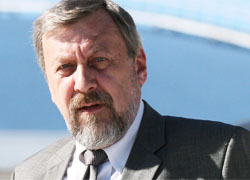 A hardline policy towards the dictator and visa-free travels to the EU for ordinary Belarusians are needed.
A hardline policy towards the dictator and visa-free travels to the EU for ordinary Belarusians are needed.Former Belarusian presidential candidate Andrei Sannikov said during an international conference in Vilnius on Tuesday that he would call for sanctions against the Belarusian government because "believe me, they work."
"Lukashenka understands only the language of sanctions," Mr. Sannikov, a former political prisoner who was granted political asylum in Britain in 2012, said during the conference, which focuses on possible strategies for the EU's engagement with Belarus. "It is necessary to take a tough line on the dictator and his regime while involving the Belarusian public in a dialogue." Mr. Sannikov called on the European Union to abolish the visa requirement for Belarusians. This measure would do much more to increase pro-European sentiments in Belarus than any statements, he said.
According to Mr. Sannikov, Europe failed to use its "window of opportunity" following the 2010 presidential election in Minsk. "The opposition was winning the election and I was the leading candidate," he said. "It's unclear why Europe didn't ask tough questions about the legitimacy of Lukashenka."
Mr. Sannikov warned against "playing liberalization" with Belarusian authorities. "The situation in Belarus deteriorates after each such attempt," he said. "If Europe is ready to assume responsibility, indeed, personal responsibility, for further repression and murders in Belarus, let it continue its policy of engaging the regime in a dialogue."
Yury Hubarevich, deputy chairman of the Movement for Freedom, said that in recent years, Mr. Lukashenka had been balancing between the EU and Russia, using a "pendulum policy" to good effect. "However, he is running out of room for maneuver," he said. "The Eurasian Economic Union Agreement may be signed in two years, which would be the point of no return for us." Mr. Hubarevich said that Europe's policy of rewarding "positive steps" by Belarus with preferences was not working. "Lukashenka's policy regarding the EU and Russia is very simple—get as much money as possible without making any decisions that may affect the stability of his government," he said. Mr. Hubarevich said that Europe should try to influence Mr. Lukashenka through the Belarusian public. "Lukashenka is forced to take public opinion into account," he said. "On several occasions, he backed down in the face of public indignation." For example, he had to order the reduction of motor fuel prices after their drastic increase and then withdrew his own proposal to impose a $100 exit duty on Belarusians traveling abroad for shopping, he said. Polls indicate that about 40 percent of the Belarusians are in favor of rapprochement with Europe, Mr. Hubarevich said, adding that Europe should use this lever to influence the regime. Anatol Lyabedzka, chairman of the United Civic Party, said that the EU should push for the release and exoneration of all political prisoners in Belarus and also demand that the government hold free and fair elections. If the government releases the political prisoners without exonerating them, the root cause of politically motivated persecution will remain, and new political prisoners will eventually appear, Mr. Lyabedzka said.
Kilde : http://charter97.org/en/news/2013/10/29/78690/
Belarusians must prepare for car tax
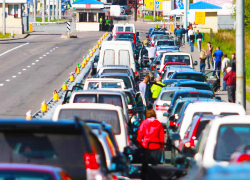 A car tax will include taxes on ecology, parking lots and space.
A car tax will include taxes on ecology, parking lots and space.Experts proposed to impose a car tax in Belarus in the article “Take Post”.
“People should understand that a car is a hazardous instrument both for space and ecology. People must pay for it,” Armen Sardarov, the dean of the Architectural Faculty of Belarusian National Technical University, said during a discussion of parking lots with Savetskaya Belorussia newspaper. “I think a car tax must include taxes on ecology, parking lots and the public space occupied by a vehicle.”
“It is a matter of health for every resident. Those who have met the situation when car owners warm up their cars every morning in the yard understand it. You cannot breathe there. But you cannot explain anything to car owners. They know just one thing: they park their cars here, so they will warm them up here, not in another place,” Armen Sardarov explained his proposal to impose an additional tax.
We remind that the municipal authorities put forward an initiative of imposing a car tax in 2009.
“We need a car tax in Minsk,” then chairman of the Minsk city executive committee Mikalai Ladutska said. “There are about 500,000 cars in the city. Car owners spend an average of 200,000 rubles a month on fuel, or 1 or 2 million a year. Let's collect at least 60,000-70,000 rubles from every car owner and we'll get 30 or 40 million annually.”
Mikalai Ladutska proposed yesterday to encourage Minsk residents to pay for parking lots construction.
Kilde : http://charter97.org/en/news/2013/10/29/78664/
torsdag 24. oktober 2013
Mylène Farmer signs petition against the death penalty in Belarus
 Three days before her arrival in Minsk Mylène Farmer signed a
petition of the campaign "Human Rights Defenders against the Death
Penalty in Belarus."
Three days before her arrival in Minsk Mylène Farmer signed a
petition of the campaign "Human Rights Defenders against the Death
Penalty in Belarus."The well-known French singer did not remain indifferent to a letter from the International Federation for Human Rights (FIDH) and the Human Rights Center "Viasna", in which human rights activists told her about the nature of the problem of the death penalty in Belarus - the last country in Europe, where people are still deprived of life on behalf of the state.
"There can be no higher goal, more holy, more worthy than this one: abolish the death penalty," Mylène Farmer quoted these lines when signing the petition. They belong to the French writer Victor Hugo, who in the preface to the novel "The Last Day of a Condemned Man" (1829) expresses his feelings that the death penalty should be abolished, wondering why one person has the right to take the life of another and claiming that his role is "the role of patron for all possible defendants, either guilty or innocent, before all the courts and the tribunals, before all the jurors, before all the arbiters of justice."
The petition calls on the Belarusian authorities to abolish the death penalty in the country: "Today, when all the countries of Europe and the former Soviet Union have abolished the death penalty, it is time for Belarus to join the civilized space of humanism, a space free from murder by the state."
Activists of the campaign "Human Rights Defenders against the Death Penalty in Belarus", launched in 2009, suggest signing the petition to the world-famous individuals – to emphasize the importance of the problem and to attract the attention of people all over the world to the death penalty as a problem that knows no national boundaries. In 2010, the petition was signed by the famous British musician Sting, who also recorded a video message entitled "Time to Change", and in 2012 the campaign was supported by the Swedish singer Loreen, the winner of "Eurovision-2012".
Kilde : http://charter97.org/en/news/2013/10/24/78339/
lørdag 12. oktober 2013
Diktaturer bør ikke belønnes
En av de største skamplettene den avtroppende regjeringen etterlater
seg, er en nesten ferdigforhandlet frihandelsavtale med Hviterussland,
Europas siste diktatur.
 Den nye regjeringen må få stanset dette prosjektet i siste liten.
Den nye regjeringen må få stanset dette prosjektet i siste liten.
Nylig startet den siste forhandlingsrunden mellom EFTA-landene Island, Liechtenstein, Sveits og Norge og tollunionen mellom Russland, Kasakhstan og Hviterussland om å inngå en avtale om frihandel. Forhandlingene gjennom hele året har gått såpass bra at Norge antagelig vil kunne inngå en frihandelsavtale med Hviterussland allerede i 2014. Norge står i spissen for forhandlingene. Grunn nok til å være fornøyd, vil sikkert noen mene. Flinke norske forhandlere, liksom.
Hadde det bare ikke vært for at det skjer omfattende menneskerettighetsbrudd i Hviterussland: storstilt overvåking av befolkningen, vilkårlig fengsling og tortur. Den politiske opposisjonen og sivilsamfunnet er under massivt press, og mediene kontrolleres i stor grad av staten. "I Hviterussland blir sivilsamfunnet kneblet av et undertrykkende regime som ikke tolererer noen form for kritikk", konkluderte Amnesty International i en rapport tidligere i år. Men hverken dokumenterte overgrep eller gjentatte runder med kritikk fra blant annet Venstre som stilte spørsmål om saken på Stortinget, ser ut til å ha gjort inntrykk på statsminister Jens Stoltenberg og nærings- og handelsminister Trond Giske.

Å inngå en frihandelsavtale med Hviterussland betyr å gi direkte støtte til Lukasjenkos brutale og illegitime regime. Mer enn 80 prosent av den økonomiske aktiviteten i Hviterussland eies og styres av staten. Avtalen vil også svekke de sivile og opposisjonelle kreftene i landet som arbeider for å fremme demokrati. Av nettopp denne grunnen har EU avvist å diskutere en slik avtale og dessuten innført en rekke økonomiske sanksjoner mot Hviterussland. Sanksjoner som Norge i 2012 sluttet seg til, forresten. Og så skal vi gå og undergrave dette ved å drive frihandel med landet i stedet? Hvordan kunne Norge synke så dypt i et så prinsipielt spørsmål?
De rødgrønne er blitt drevet av ønsket om økt handel med Russland. At menneskerettighetssituasjonen også i Russland er blitt forverret de siste årene, har jo aldri vært noe problem for regjeringen Stoltenberg. Forholdet til den store naboen i øst har vært ansett som svært viktig, ikke minst for norske olje- og gassinteresser. En frihandelsavtale skulle krone det strategiske partnerskapet, selv om Hviterussland følger med som nissen på lasset. Hensyn til menneskerettigheter, demokrati og politisk anstand måtte vike til fordel for økonomisk gevinst.
Regjeringsskiftet gir oss nå anledning til å stanse de videre forhandlingene umiddelbart – selv om disse befinner seg i den siste runden. Et nei til frihandel med Hviterussland vil sende et kraftig signal om at Norge etter Stoltenberg-regjeringen ikke ønsker å belønne avskyelige regimer gjennom handelsavtaler og at profitten ikke alltid slår knockout på etikken.
Kilde : http://www.aftenposten.no/meninger/debatt/Diktaturer-bor-ikke-belonnes-7337154.html
Foto : http://www.arche.by/by/page/print/2960
http://www.svaboda.org/content/transcript/24703300.html
Nylig startet den siste forhandlingsrunden mellom EFTA-landene Island, Liechtenstein, Sveits og Norge og tollunionen mellom Russland, Kasakhstan og Hviterussland om å inngå en avtale om frihandel. Forhandlingene gjennom hele året har gått såpass bra at Norge antagelig vil kunne inngå en frihandelsavtale med Hviterussland allerede i 2014. Norge står i spissen for forhandlingene. Grunn nok til å være fornøyd, vil sikkert noen mene. Flinke norske forhandlere, liksom.
Hadde det bare ikke vært for at det skjer omfattende menneskerettighetsbrudd i Hviterussland: storstilt overvåking av befolkningen, vilkårlig fengsling og tortur. Den politiske opposisjonen og sivilsamfunnet er under massivt press, og mediene kontrolleres i stor grad av staten. "I Hviterussland blir sivilsamfunnet kneblet av et undertrykkende regime som ikke tolererer noen form for kritikk", konkluderte Amnesty International i en rapport tidligere i år. Men hverken dokumenterte overgrep eller gjentatte runder med kritikk fra blant annet Venstre som stilte spørsmål om saken på Stortinget, ser ut til å ha gjort inntrykk på statsminister Jens Stoltenberg og nærings- og handelsminister Trond Giske.

Å inngå en frihandelsavtale med Hviterussland betyr å gi direkte støtte til Lukasjenkos brutale og illegitime regime. Mer enn 80 prosent av den økonomiske aktiviteten i Hviterussland eies og styres av staten. Avtalen vil også svekke de sivile og opposisjonelle kreftene i landet som arbeider for å fremme demokrati. Av nettopp denne grunnen har EU avvist å diskutere en slik avtale og dessuten innført en rekke økonomiske sanksjoner mot Hviterussland. Sanksjoner som Norge i 2012 sluttet seg til, forresten. Og så skal vi gå og undergrave dette ved å drive frihandel med landet i stedet? Hvordan kunne Norge synke så dypt i et så prinsipielt spørsmål?
De rødgrønne er blitt drevet av ønsket om økt handel med Russland. At menneskerettighetssituasjonen også i Russland er blitt forverret de siste årene, har jo aldri vært noe problem for regjeringen Stoltenberg. Forholdet til den store naboen i øst har vært ansett som svært viktig, ikke minst for norske olje- og gassinteresser. En frihandelsavtale skulle krone det strategiske partnerskapet, selv om Hviterussland følger med som nissen på lasset. Hensyn til menneskerettigheter, demokrati og politisk anstand måtte vike til fordel for økonomisk gevinst.
Regjeringsskiftet gir oss nå anledning til å stanse de videre forhandlingene umiddelbart – selv om disse befinner seg i den siste runden. Et nei til frihandel med Hviterussland vil sende et kraftig signal om at Norge etter Stoltenberg-regjeringen ikke ønsker å belønne avskyelige regimer gjennom handelsavtaler og at profitten ikke alltid slår knockout på etikken.
Rebekka Borsch,
sentralstyremedlem i Venstre
Kilde : http://www.aftenposten.no/meninger/debatt/Diktaturer-bor-ikke-belonnes-7337154.html
Foto : http://www.arche.by/by/page/print/2960
http://www.svaboda.org/content/transcript/24703300.html
mandag 16. september 2013
Nasjonalflaggets- og riksvåpenets dag - 19.september
Organisasjonen "Belarusian National Memory" appellerer til hviterussere både innenfor og utenfor Hviterusslands grenser:
Den 19. september 1991 ble de gamle sovjetiske symbolene og det gamle navnet på landet avskaffet av datidens øverste råd av BSSR, og et nytt navn ble gitt istedet - Republikken Hviterussland.
Det hvitt-rødt-hvite flagget og våpenskjoldet Pagonya ble nye, offisielle symboler.
Lederen av BNM, Anatol Michnaviec ber i forbindelse med denne datoen, alle hviterussere om å henge ut et hvitt-rødt-hvitt flagg.

Den 19. september 1991 ble de gamle sovjetiske symbolene og det gamle navnet på landet avskaffet av datidens øverste råd av BSSR, og et nytt navn ble gitt istedet - Republikken Hviterussland.
Det hvitt-rødt-hvite flagget og våpenskjoldet Pagonya ble nye, offisielle symboler.
Lederen av BNM, Anatol Michnaviec ber i forbindelse med denne datoen, alle hviterussere om å henge ut et hvitt-rødt-hvitt flagg.

Lukashenka awarded for idiocy
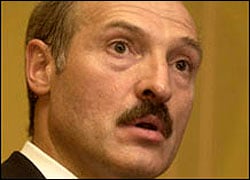 Harvard University awarded the Belarusian dictator with the Ig Nobel Prize.
Harvard University awarded the Belarusian dictator with the Ig Nobel Prize.The Ig Nobel Prize ceremony to honour achievements that “first make people laugh, and then make them think” was held at Harvard University on Thursday.
The award was founded by Mark Abrahams and the humour magazine Annals of Improbable Research.
Harvard University honoured Lukashenka's achievements in fighting opposition protests: he received his prize for making it illegal to applaud in public. Special attention was given to the story of arresting a one-armed man for applauding. Organisers couldn't reach the dictator and invite him to the ceremony.
It looks symbolic that Leanid Kozik, the chair of the Federation of Belarusian Trade Unions, proposed to nominate Lukashenka for the Nobel Prize in Economics amid the crisis in 2011.
Video : http://www.youtube.com/watch?feature=player_embedded&v=ULVQJSxZ0pI
Kilde : http://charter97.org/en/news/2013/9/13/75592/
søndag 15. september 2013
Ridderne samlet på Leeds Castle
onsdag 11. september 2013
European carrot for a monster
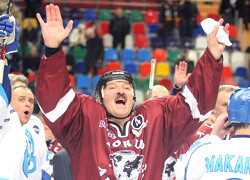 Lukashenka’s power is under a threat, and the European Union should not save Europe’s last dictator.
Lukashenka’s power is under a threat, and the European Union should not save Europe’s last dictator.“I was released from one prison into another, a bigger one”, - a youth leader Dzmitry Dashkievich said, having left the place of his imprisonment last week.
It may seem that the number of political prisoners in Belarus has started decreasing. However, political prisoners are not being released by the order of the dictator, but because the terms of their imprisonments expired. On 28 August Dzmitry Dashkievich was released, Aliaksandr Frantskievich was released in a few days after that. The freedom is very relative – after the release they will be under police supervision and may be sent to prison again any moment. This already happened with other oppositionists.
It is important to remember that Dashkievich did not simply spent his prison term in full, but was held in custody for a year longer than the initial sentence for not recognizing himself guilty and “bad behavior” behind bars. Like many other political prisoners, in prison he underwent physical and psychological pressure and was kept in inhuman conditions. Over ten political prisoners remain in Belarus in such conditions, including a former presidential candidate Mikalaj Statkievich and the leader of the human rights movement Ales Bialiatski. Last month the list of political prisoners grew longer by two sentenced opposition activists, detained priest and a psychiatrist, who criticized the authorities.
However, even in these conditions the lobbyists of the Lukashenka regime are able to speak with European politicians of “good will” on the part of the regime. Actually, it could have been much worse: they could have not released Dashkievich, but add another additional prison term for him. And yes, another political prisoner Hajdukou was not sentenced to 8 years in prison, like the prosecutor had initially demanded, but “only” to a year. The ruler of Belarus is very kind!
But let’s leave the sarcasm alone: there are 185 names in the list of political prisoner for the 20 years of the regime’s existence. And at least four disappeared political opponents. And hundreds of thousands of the people, who left the country because of political persecution. And complete absence of investigations of human rights violations, a stable atmosphere of impunity, the continuation of repressions.
For all these 20 years with regular periodicity the EU offered the Lukashenka regime different carrots for engaging him into the “European orbit”. The monster swallowed these carrots, asked for more, and took new hostages in the meanwhile in order to exchange them for another portion of carrots. That is why one cannot but be surprised by the naivety, or rather cynicism of those European and Belarusian politicians and experts, who are now suggesting the expansion of economic cooperation and renewal of the political dialogue with Belarus without the release and exoneration of all the political prisoners and the start of systematic democratic changes.
These lobbyists are again referring to the necessity of having a dialogue and the usefulness of the carrot policy. They are again using the argument that if the EU made steps towards Lukashenka, “the political prisoners could probably be soon released”. Because there allegedly were some misty promises of that on the part of the dictator. This compromising position is a total contradiction to the demands of Lukashenka’s principled opponents, including the political prisoners, remaining in custody.
The voting on a report on the EU’s policy towards Belarus (Paletskis’ report), scheduled for this week, clearly reflects this tension between the principled and compromising positions. After multiple discussions and introduction of amendments by the parliament’s Foreign Committee there are indirect and even direct recommendations of broadening the economic cooperation with Belarus left in the report’s draft. At the same time there have been no positive changes in the country. This report, in its essence, declares the EU’s position on Belarus. If it is supported by the European Parliament like it is, it will be an approving signal to the dictatorial regime and a discouraging signal to those, who are fighting for democracy and the rule of law in Belarus.
In Europe they still do not want to learn the lesson of the twenty years: Lukashenka is not capable of sticking to an agreement. His representatives may give cloudy promises, he may act like he is interest in a partnership, but any agreement will be broken. This happened multiple times. A fine example of that was the very fresh story of the “potassium war” with Russia and the arrest of a Russian businessman Vladislav Baumgartner, who came to Minsk by the Prime-Minister’s invitation. Lukashenka decided to use the practice that he has long and successfully used in the Western front – taking hostages – for forcing a Russian company Uralkali to cancel its decision to withdraw from the joint cartel with a Belarusian partner.
It is not important how this story ends for Uralkali, it is important that it clearly shows how Lukashenka makes deals. He is able of biting any hand, even the one that feeds him and provides for his wellbeing. In this case this means oil, gas and loans from Russia. This, by the way, completely disproves the argument of the lobbyists (and the regime itself) that Belarus “will go to Russia” in the case the West increases pressure on Lukashenka.
It is surprising, but Europe has still not realized the difference between the approach to business in the EU and Belarus. There is no independent business in Belarus – it is completely controlled by the regime and the system that Lukashenka’s family has built. It is exactly the dictator who in the end decides, who can and who cannot do business in Belarus. A foreign investor, coming to Belarus, is measured in the same way – it is Lukashenka, who decides everything.
Moreover, foreign business is considered a regime’s leverage of influence on the EU policy. We saw the examples of such successful influence through business connections in 2011, when the enterprises of an oligarch Jury Chyzh from Lukashenka’s entourage had EU sanctions lifted. This was done with the help of Latvia. Separating the pragmatics of economic cooperation from a political dialogue in words, Lukashenka skillfully ties them together in practice.
However the regime’s difficult economic situation and Russia’s tough position led to the situation, when Lukashenka has nowhere to go for help apart from the EU – for new loans and the expansion of trade. The threat of not being able to last until the 2015 presidential elections becomes real for Lukashenka.
A lot now depends on whether the possible economic carrot from the EU becomes a buoy for the regime that is unwilling to change. Or instead of exchanging “positive” signals the EU, including the European Parliament, presents the regime in distress with an ultimatum – “change or drown”. The European Union instead of trying to broaden the economic cooperation and “improve the relations” with the regime should make it change and implement reforms, which will ensure a democratic, successful European future for Belarus. It is hard to imagine a better time for putting forward tough demands, than now.
Calling economic cooperation a carrot for the regime, inviting European business to deal with Belarus the EU should understand: entering economic relations with the Lukashenka regime European business is responsible for financial and political consolidation of the dictatorial regime, the continuation of repressions and the fate of political prisoners. Moreover, it risks its own assets, its people and its reputation.
Olga Zakharova, Jury Dzhibladze, specially for charter97.org
Kilde : http://charter97.org/en/news/2013/9/10/75386/
mandag 9. september 2013
From potash powerbroker to Minsk prison, the cost of crossing Belarus
By Polina Devitt
MOSCOW |
Sun Sep 8, 2013 4:05am EDT
Belarus, which has long bridled at what it believes is Uralkali's aim to take over its own producer Belaruskali, was angered by Uralkali's abrupt exit from BPC last month, a move likely to lower prices, hit a key source of hard currency and hurt Belarus's rickety economy.
The Belarusian Investigative Committee has not provided details on the charge, though among comments it made at the time of Baumgertner's arrest are allegations that he and others at BPC provided discounts on product to some buyers without telling the Belarusians, redirected ships to take Uralkali product instead of Belaruskali's, and cancelled some BPC contracts, promising partners a Uralkali alternative at lower prices.
Uralkali denies any wrongdoing and has said previously that Baumgertner did not have the powers the Belarus authorities say he abused.
HANDCUFFED AT THE AIRPORT
After travelling to Belarus for talks less than a month after pulling out of BPC, Baumgertner was handcuffed at the airport as he was leaving on August 26 and thrust into the heart of an acrimonious battle between Moscow and Minsk.
He, along with Uralkali's chairman, former Kremlin chief-of-staff Alexander Voloshin, and the company's leading shareholder, Suleiman Kerimov, had been invited to Belarus by the country's prime minister. Only Baumgertner went.
He is being held in the pre-trial detention centre of the Belarusian KGB, known to locals as 'Amerikanka', or the American one, apparently after a Chicago jail.
His requests have been for unspecified medication, and for Tolstoy's "Anna Karenina", an 864-page classic that will fill several long days.
Conditions are likely to be tough for the slight Baumgertner.
Anatoly Lebedko, Belarusian politician and leader of the United Civic Party, spent 108 days in Amerikanka for taking part in protests after President Alexander Lukashenko was re-elected in 2010.
He described the cells, the largest 2.5 meters by 5 meters, as dark, grey, crowded and damp. Lebedko was one of six in a cell built for four, in temperatures typically below 14 degrees Celsius (57 Fahrenheit).
"There are many ways to add pressure. If you're not ready, if you are not physically ready for conditions which are far from comfortable, it will be very hard for you," he said.
Prisoners are taken from the cells twice a day to the toilet facilities, though Lebedko says there are "VIP cells" with internal toilets.
Baumgertner is not the first top Russian executive to end up in jail. But it would have been a considerable shock for him, as it was for those around him, both competitors and friends said.
"The board was apprised of the history, of the difficulties of the apparent divergence of objectives (between the cartel partners) that had been progressively building," said Uralkali Deputy Chairman Robert Margetts.
"Of course we spent a lot of time on the commercial and financial risks and the consequences (of pulling out) - but I have to say, I had not considered this."
REFRESHING CHANGE
Baumgertner is by all accounts a soft-spoken boss, with a cheerful countenance. Rivals and colleagues describe a methodical, tough negotiator whose approach to staff and the public is a far cry from Soviet-trained predecessors'.
"He is a man of his word, a rare thing in our times," said Maxim Volkov, former chief executive of Russian fertilizer company Phosagro.
Baumgertner, who had been in the utilities sector and later studied in London, joined Uralkali for the first time in 2003 as chief commercial officer, rising to chief executive in 2005.
He left in 2010 when demoted under the then owners and became CEO of another fertilizer producer, Silvinit. Supported by key shareholder Kerimov, he returned in 2011 after Uralkali bought Silvinit.
He is described as having built a young, ambitious management team, and praised for his efficiency, perhaps a product of his engineer's training. In a country where bad news is often muffled, his instinct for openness stands out, including during a damaging 2006 flood at a mine in the Urals and when dramatic sinkholes appeared in the potash mining town of Berezniki.
"Vladislav, as (CEO) at the time and despite some people at Uralkali being reluctant to go public, opened all the doors, invited the best consultants around the world to help and did not try to hide these issues from the public," said Henry Rauche, chief executive of Ercosplan, a German engineering and consulting company working for the potash industry.
"He was a refreshing change after the Soviet style leadership in the former Russian potash industry."
He has not been seen in public or photographed since his arrest.
(Additional reporting by Alessandra Prentice, Natalia Shurmina and Victoria Andreeva in MOSCOW, Andrei Makhovsky in MINSK and Clara Ferreira-Marques in LONDON; Writing by Clara Ferreira-Marques; Editing by Will Waterman)
Kilde : http://www.reuters.com/article/2013/09/08/us-uralkali-ceo-idUSBRE98703G20130908
søndag 8. september 2013
8 september 1514 seier ved Orsha
 8 september 1514 vant våre forfedre et av de mest betydningsfulle slag på den tiden - slaget ved Orsha.
8 september 1514 vant våre forfedre et av de mest betydningsfulle slag på den tiden - slaget ved Orsha.Lenge Leve Belarus!
On September 8 Belarus celebrates one of its most important and legendary holidays, the Day of Belarusian Military Glory.
This holiday reminds about the historical date, the victory of the Grand Duchy of Lithuania’s troops over troops of Moscow principality in the battle on September 8, 1514 near the town of Vorsha (Orsha).
The great battle was a victorious battle in this yet another war with Moscow principality, when Muscovite forces tried to occupy the territory of Belarus. One of the main heroes of the Vorsha battle was of Hetman Kanstantsin Astrozhski. He was in command of the 30,000 troops which defeated more than 80,000 troops of Moscow principality.
Only in the end of the 1980ies celebration of the Belarusian Military Glory Day started. And in 1992 on the anniversary of the great battle Belarusian officers solemnly took an oath to their native country and nation in Minsk on Independence Square. On September 8, 1992 in Minsk 12 officers and 3,000 reserve soldiers took an oath. Later participants of that ceremony were under pressure of the authorities, but in a short time all military units took an oath of loyalty to Belarus.
Abonner på:
Kommentarer (Atom)







